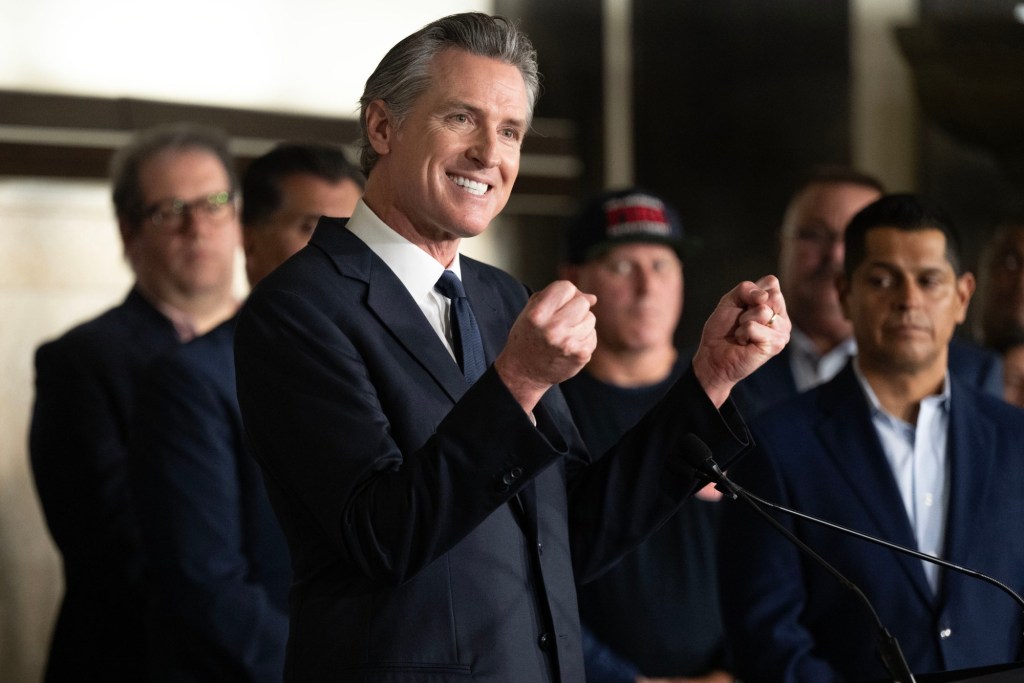California Governor Gavin Newsom called for support for Proposition 1 on the March 5, 2024 ballot during a press conference at Los Angeles General Medical Center on Wednesday, January 3, 2023. The proposal would overhaul California's mental health funding system, with a $6.4 billion bond to expand access for hundreds of thousands of Californians, fund substance abuse treatment, and address the mental health crisis. It will help get people in distress off the streets and into care. (Photo by Hans Gutknecht, Los Angeles Daily News/SCNG)
Gov. Gavin Newsom's mental health package, Proposition 1, continues to maintain a narrow lead, with opposition leaders admitting possible defeat on Tuesday.
The measure requires a simple majority to pass, but as of Tuesday afternoon's updated polls, 50.4% of voters supported it and 49.6% opposed it.
See the latest election results.
“We came very close to killing the bear, but we are no closer. Today, as the primary opponents of Prop. 1, we acknowledge that Prop. 1 is almost certain to pass.” Californians Opposed to Proposition 1 said in a statement Tuesday morning.
Proposition 1 is a $6.4 billion bond measure aimed at overhauling the state's approach to mental health by significantly increasing the number of treatment beds and supportive housing facilities.
It would direct $4.4 billion to create 10,000 new mental health beds and $2 billion to support homeless housing projects. Half of the new housing will be set aside for veterans with mental illness or substance use issues.
Additionally, the measure would require counties to spend 30% of their revenue from the Mental Health Services Act on housing. The voter-approved law would generate $2 billion to $3.5 billion annually for mental health services by imposing a 1% tax on income over $1 million.
Newsom touted the measure as a way to “fix our broken mental health system and provide needed care to people living on the streets and struggling with substance abuse.”
He raised more than $20 million to advance this measure and mobilized the support of many influential organizations, including the National Alliance on Mental Illness of California, the California Hospital Association, the labor union SEIU California, and the California Chamber of Commerce. .
By comparison, the “No to Proposition 1” campaign raised very little. The plan was led by mental health advocacy groups such as Disability Rights California, which was concerned that changes in funding priorities for the Mental Health Services Act would lead to service cuts in existing mental health programs. These groups also opposed funding for mental health treatment beds that could force people to accept involuntary treatment.
Other opponents, such as the Howard Jarvis Taxpayers Association, opposed large government spending.
“Our grassroots movement had a hard time competing with the $20 million from the 'yes' side, which was so overconfident and cash-stuffed that it ran Super Bowl ads.” The group's statement said. “And yet we almost won. Our message and truth were that powerful.”
Initial polling showed two-thirds of likely California voters supported the measure, according to the Public Policy Institute of California, but that support had waned in the weeks before the election. It decreased to 59%.
Proponents of Proposition 1 have not yet declared victory. Passage of the bill would be a major political victory for Newsom, who chose to put it on the March ballot so it wouldn't have to draw attention to other bills in November.
The decision was almost disastrous, as key voters skewed conservative and the measure teetered on the brink of failure as ballots continued to be updated. At one point, just 13,000 votes stood between passing the bill and rejecting it in a state with 22 million registered voters.
Nevertheless, the percentage of votes supporting the bill has increased in recent updates, and it appears poised to pass by a narrow margin. The Secretary of State's Office will continue to provide voting information on a regular basis and will certify results by April 12th.


